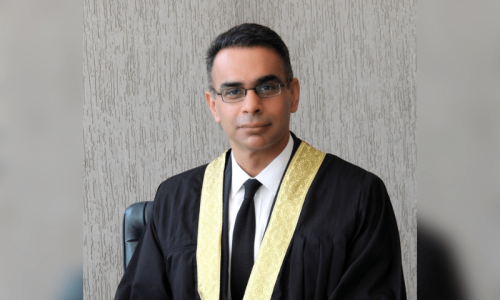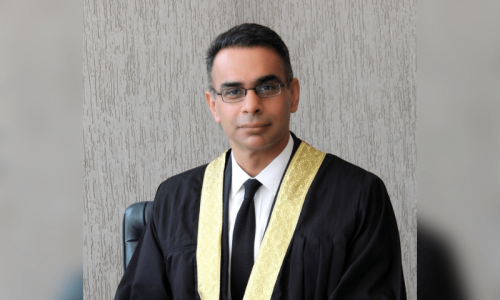ISLAMABAD: A division bench of the Islamabad High Court (IHC) on Wednesday restored the powers of the Islamabad chief commissioner and deputy commissioner (DC) that were taken away after a single-member bench stripped the DC of his powers to detain individuals under the Maintenance of Public Order (MPO).
An IHC division bench comprising Chief Justice Aamer Farooq and Justice Tariq Mehmood Jahangiri, during the hearing of a government appeal against the decision of Justice Babar Sattar, allowed the district administration to perform its functions.
Additional Attorney General Barrister Munawar Iqbal Duggal appeared before the bench. He argued that the Presidential Order of 1980 was protected through a constitutional amendment in 1985. He said that Article 270 protected the said order, therefore, it could not be termed ultra vires to the Constitution.
He requested the court to suspend the ruling till the final decision on the appeal.
Justice Sattar in the decision on PTI leader Shehryar Afridi stripped the deputy commissioner of his powers to detain individuals under the Maintenance of Public Order law and also withdrew chief commissioner’s power to govern the federal capital.
AAG Duggal says Presidential Order of 1980 protected by Article 270 of Constitution
The decision had technically rendered the capital administration dysfunctional since the court order had declared the framework to govern the city ultra vires. The offices of the Registrar Cooperative Societies, Board of Revenue, and Labour Department particularly had become dormant in light of the judgement.
Justice Babar Sattar in an 83-page judgement had declared “PO [presidential order] No. 18 of 1980, PO No. 2 of 1987, PO No. 2 of 1990 and notifications issued under declaring the administrator or chief commissioner Islamabad to be the provincial government for purposes of ICT are ultra vires of the Constitution and therefore declared to be void”.
Presidential Order 18 of 1980 “conferred executive authority of the federation to an administrator for the Islamabad Capital Territory, later designated as a chief commissioner Islamabad”.
Presidential Order No. 2 of 1987 provided that the president may, at any time, by order in writing direct that the executive authority of the federation in respect of ‘Islamabad Capital Territory’, in so far as it relates to any matter specified in the order, shall be exercised by such authority and the chief commissioner was designated to govern the federal capital.
It may be noted that before 1980, Islamabad was governed through a naib-tehsildar of the Punjab government and the order of 1980 introduced the concept of a provincial government but without any chosen representatives.
The judgement authored by Justice Sattar asked the federal government to govern Islamabad till the rules to operate the provincial government were finalised. The court also set a three-month deadline to frame the rules.
The verdict also cited the 2016 Supreme Court Mustafa Impex case, which requires decision or exercise of authority by the government concerning Islamabad Capital Territory (ICT), whether as federal or provincial governments by the federal cabinet as collegium.
The judgement also cited the population census of 2023 and said approximately 2.364 million citizens live in the federal capital. Article 1(2)(b) of the Constitution identifies ICT as the federal capital that does not form part of any province. According to the judgement, the chief commissioner, a BSP-20 officer, was acting as a ‘one-man provincial government’ for Islamabad and its citizens.
The judgement also explained that Article 99 of the Constitution creates a mandatory obligation for the federal government to frame rules for the allocation of its business and such business of the federal government includes the power, duties and functions to be discharged in its capacity as the provincial government.
The declaration of the high court that the federal government was also the provincial government for ICT and the chief commissioner was not the provincial government for ICT would only apply prospectively and would not affect past and closed transactions.
The judgement was clear when it explained that notwithstanding the time frame provided for framing appropriate Rules of Business for purposes of ICT, any decision ought to be taken by the provincial government under any law for the time in force in ICT can only be taken by the federal cabinet.
Published in Dawn, January 25th, 2024














































Dear visitor, the comments section is undergoing an overhaul and will return soon.